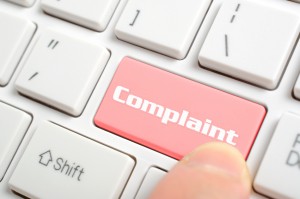
Don’t touch that button…
Trial lawyers could easily spend all day (and night) complaining — about adversary counsel, parties, judges, clerks, themselves. Stop wasting time — and, worse, focus. Only complain at predetermined times. I’m serious.
I’m not a novelist so I don’t know how a novelist ordinarily spends her days. I know I barely have the discipline to sit at a desk for more than a few minutes at a time (which is why I can more commonly be found making edits at local cafes or bars than my actual office). As such, the thought of sitting (even at a great Irish pub or dive bar) and focusing on writing a book, day after day, sounds excruciating to me. I could never do it and compliment the discipline of those that do.
While the novelist’s work looks impossible to me, I can understand one benefit of it (at least to some) which is that, unlike your typical trial lawyer, the novelist is not required to deal with many people every single day. Sure, I understand that some novelists spend a lot of time researching. But at some point, they spend a lot of time writing, alone, uninterrupted, otherwise they will never produce a book. And that means fewer frustrations and arguments (though I side with Mario Cuomo on the view that, “For a New Yorker, a day without an argument is a wasted opportunity”).
The best trial lawyers, on the other hand (as Mario Cuomo did) swim in interactions with others every day — in and out of court, with colleagues, clients, adversaries, witnesses, clerks, discovery vendors, you name it. And dealing with a lot of people means you can probably find a lot of reasons to complain: the colleague that didn’t get you something when promised; the client that is late with her bill; the adversary that is simply a jerk; the witnesses who do not want to cooperate; the clerks who act like clerks. The list goes on.
Absolutely resist the temptation to complain. You will waste your time and lose your focus. Indeed, at our firm we have a rule which is that complaints are simply not allowed. I’m sure the rule gets violated here and there, but the point is less to have a rule than to have a culture and a way of doing things.
First, as noted, complaining really does not solve anything. I don’t frequently reference scripture in this column, but the biblical admonition not to worry and that it does not help at all applies to this rule against complaining. You are not solving anything when you complain. Stop wasting time.
Second, and more important to me, though, is that complaining results in lost focus, taking it off of what it should be on every minute of the day: winning for the client and, breaking that down a bit, the steps you should be taking, right now, to help your client achieve whatever winning is. If you complain you simply cannot help but build evidence in support of your complaint (I mean, you are a trial lawyer after all). I know of nobody who simply says, “That adversary was discourteous,” without further comment. Instead, it is, “You believe that guy? He made the comment in his email, then on the call he said the same thing. I know he was trying to impress the junior associate, but what a jerk,” and so on. This proves my wasting time point.
But as noted, my bigger concern is the lost focus: rather than keep your energy and intellect on the goal of winning, you think of how much a jerk that guy is, how you might be able to get him back, how you want your colleagues or boyfriend or kid or whomever to agree with you. Don’t take the bait. Let the jerk be a jerk, but focus on winning. Even better, figure out (while never underestimating your adversary or anyone) how you can use that jerkiness to help you win: will he make a bad impression in court? Will the jerk miss a nuanced point since he’s so consumed with showing how smarmy he is?
Note that in the intro I did acknowledge that there must be some complaining at what I called “predetermined times.” At our firm that’s at Friday drinks where staff casually meet for a beer or whiskey or maybe a seltzer and the usual “No Complaint Rule” we have is lifted. The metaphors of unwinding and blowing off steam feel particularly apt under those circumstances, and everyone, at all levels, is free to tell the story about that jerk adversary, or difficult judge, or whomever or whatever. And then people get their real sabbath on the weekend, complaints pretty much out, ready for another No Complaining Week.
Lawyers could fill their waking hours complaining. We should not. Stay focused. Have an outlet for the frustration. And just win for the client.
John Balestriere is an entrepreneurial trial lawyer who founded his firm after working as a prosecutor and litigator at a small firm. He is a partner at trial and investigations law firm Balestriere Fariello in New York, where he and his colleagues represent domestic and international clients in litigation, arbitration, appeals, and investigations. You can reach him by email at john.g.balestriere@balestrierefariello.com.
No comments:
Post a Comment